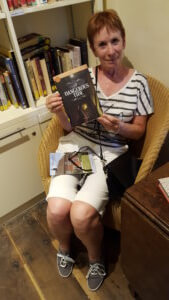 Talk about encouragement! I was sent this photo a couple weeks ago. Her name is Kathy Carter, and when she and her husband visited England recently, they stopped at Jane Austen’s home in Chawton. She is in the reading room, and she found my Jane Austen book, A Dangerous Tide, on the shelf. I was astounded that it was still there.
Talk about encouragement! I was sent this photo a couple weeks ago. Her name is Kathy Carter, and when she and her husband visited England recently, they stopped at Jane Austen’s home in Chawton. She is in the reading room, and she found my Jane Austen book, A Dangerous Tide, on the shelf. I was astounded that it was still there.
As I wrote in this blog post “Jane Austen and Me,” the book had been accepted to be housed in Jane’s home for 12 months, at which time it would be taken down to make room for others. But the photo of Kathy showed that my mystery was still in Jane’s home, 29 months after it was added. I would have been thrilled with the unexpected news at any time, but that particular morning, it was heaven sent.
I had gotten bogged down in my “dream project,” another historical set in England, wondering if I were chasing rainbows. For decades now, I’ve had contracts before I started writing any books. So working again without a contract on something where I don’t have a buyer lined up feels like tight-rope walking without a safety net. I was waging a war with self-doubt about continuing to pursue this project when the photo of Kathy Carter arrived in my email’s Inbox. What encouragement that was to me just when I needed it!
Encouragement to Keep Writing
Writers all need encouragement. Sometimes we need it because we’re starting out, piling up rejections, and wondering if we’re wasting our time. Sometimes we need encouragement if published books don’t garner the sales or 5-star reviews we hoped for. And sometimes (like me now), we are attempting a book outside of our normal niche, and one that requires skills we don’t yet have.
The way we get encouragement has changed over the years. When I started writing, we got fan letters from kids in snail mail only, and they weren’t part of a class assignment. (They sometimes started out, “I hope you’re not dead like the last author I wrote to.”) It was easy to save letters in a box back then. Now, you need computer files or places to back up  in the cloud if you want to peruse such things later for encouragement on the days when the words don’t flow or your rejection letters outnumber your fan letters ten to one.
in the cloud if you want to peruse such things later for encouragement on the days when the words don’t flow or your rejection letters outnumber your fan letters ten to one.
Or you can do like I’ve started to do. I print out photos and put them where I can see them. I plan to add Kathy Carter’s picture to this Jane Austen photo group on my office wall. It’s important to do things like this so that you’re reminded of your good news. Otherwise, you can forget all about it in less than an hour as various crises happen and life rushes in to fill your time.
Encouragement On Your Own
But what if you don’t have tangible signs of encouragement? Most writing days, this will be true. You must search out your own encouragement then. There are many places online where writers can now go for encouragement. Two of my own posts include an article on how to stop discouraging yourself (Silent Sabotage) and an article (Learned Optimism) by Randy Ingermanson on simple ways to change your thinking that lift you out of discouragement quickly.
Find sources of daily encouragement. Also search for a writing group (locally or online), or start one, where encouraging each other is a large part of it. And remember to encourage other writers yourself. You will reap what you sow.




